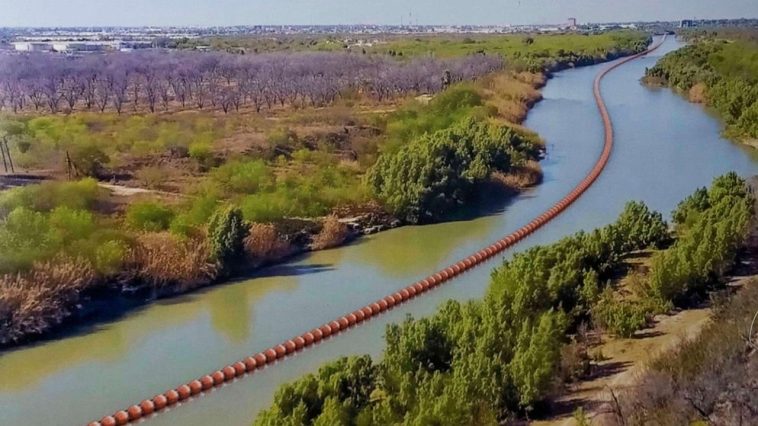LISTEN HERE:
Governor Greg Abbott of Texas, a dedicated Republican, has taken another bold stride towards fortifying the boundary from illegal incursions, a move which was swiftly followed by sharp criticism and legal action. Abbott previously faced resistance when he proposed escorting undocumented individuals towards the so-called sanctuary cities, which trend towards progressive ideologies.
The Governor’s endeavor to block illegal access to both Texas and, by extension, the United States has been deemed illegal and allegedly detrimental to local enterprises.
Upon unveiling his plan to create a waterborne barrier on the Rio Grande – the river acting as a natural boundary between Mexico and Eagle Pass in Texas – the latest initiative in Operation Lone Star was inaugurated on Friday.
This action, orchestrated by the Texas Department of Public Safety, was seen as a bold approach to border security.
Yet, within hours of implementation, Jessie Fuentes, a local entrepreneur and owner of Epi’s Canoe & Kayak Team, initiated legal proceedings. Reports from The Hill indicate that Fuentes argued his river tour business was negatively impacted by the planned barrier installations.
The lawsuit, filed in the capital of Texas, Austin, asserted that a clear interpretation of the disaster declaration inherently proves that it cannot be employed to govern the Texas-Mexico border. This is because the declaration does not address immigration issues, border security, or crimes committed by immigrants.
Moreover, Fuentes alleged in his lawsuit that he was undergoing ‘immediate and irrevocable injury’. He claimed that the definition of ‘disaster’ cannot be so expansively interpreted to enable Governor Abbott to establish his own border patrol agency, prevent immigrants from entering Texas, and install a buoy system in the Rio Grande river.
More controversy erupted from the International Boundary and Water Commission, a federal body, which claimed it was not given prior notification about the deployment of the floating barrier.
The organization’s spokesperson, Frank Fisher, made it clear they were scrutinizing Texas’s public plans to assess their potential impact on international agreements and their mission.
Fisher expressed, ‘We must evaluate how these proposals could impact our obligations to uphold treaties between the U.S. and Mexico. These treaties include maintaining border lines, flood control, and distribution of water resources, such as the Rio Grande’.
Meanwhile, Fuentes’s perspective was echoed in his concerns about the environmental implications. He stated, ‘These installations are detrimental to river flow, the river’s ecology, and its wildlife. Introducing foreign elements into the river affects all aspects of the natural ecosystem.’
Despite the backlash, Governor Abbott maintained his firm stance. He argued that by making it more difficult to traverse the Rio Grande, the strategy would effectively deter illegal crossings between entry points.
His plans prioritized the defense of the southern boundary of Texas, reflecting a continuing commitment to state and national security.
Responding to the lawsuit, Abbott remained resolute, stating, ‘We will face this in court. Don’t presume that the decision of the Travis Co. Court represents the conclusion of the matter. This issue will reach the Supreme Court.’
In no uncertain terms, the Governor emphasized Texas’s constitutional right to solidify its borders. His determination reflects a wider conservative perspective that prioritizes order, security and the rule of law.
The article underscores the ongoing tensions between the state’s executive body and local business owners – all within the broader narrative of immigration control.
It questions the balance between the imperative of border security and the potential repercussions on local economy and the environment.
In the end, the fate of the Rio Grande barrier represents more than a local or state issue, but rather, it is a matter of national importance. The debate encapsulates key conservative concerns – the right to secure borders, the rule of law, and the impact of unchecked immigration.
This case serves as a microcosm of the broader national debate on border security and immigration. While the outcome of this dispute may shape future dynamics at the Texas-Mexico border, it also carries potential ramifications for the entire United States, the predicament echoing all the way to the Supreme Court.
Whilst Governor Abbott’s staunch stand can be seen as an embodiment of conservative principles, opposing voices remind us of the complexities involved. It will be interesting to observe how this case unfolds, keeping in mind the wider implications for conservation, immigration, and border security throughout the country and beyond.


